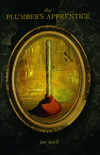The Plumbers Apprentice
Here is a collection of poems for hard times. The first section, “There Goes the Neighborhood,” re-examines life’s past warts and pimples. Weil’s poem, “In My Neighborhood, Everyone Almost Wins the Lottery” looks at where he grew up and says,
Here is a collection of poems for hard times. The first section, “There Goes the Neighborhood,” re-examines life’s past warts and pimples. Weil’s poem, “In My Neighborhood, Everyone Almost Wins the Lottery” looks at where he grew up and says,
…No one ever wins. Everyone knows someone
who would have won, if only they had followed
their hearts, or remembered an address, or
been born on a lucky day
The second part of the book, “How Holy,” calls out faith in friends or religion for its shortcomings. “Practicing Betrayal” is a poem about his childhood friends. In it, Weil writes:
At eight, I was encouraged
to dive in the filthy river.
All my friends stood at the shore,
promising they’d go next.
As soon as my head bobbed up,
I heard their laughter,
my eyes level with their sneakers,
dripping sewage, I could smell
their contempt.
They called me shit-boy for a year
“It’s Like This,” the third section of the book, acknowledges irredeemable loss and irreparable ruin, but leaves both poet and reader standing strong in defiance, which is captured in the poem “Checkmate,” a poem about facing illness:
There will no longer be good days
and there never was
a reason except maybe some
hidden test you failed
some gene you inherited
some corner of the universe
that you happened to sleep in
where all the shit piled up.
Joe Weil looks at beauty and sees the bloated underside where ugly makes a home; tells beauty to take a walk and falls in love with ugly. He examines his faith and everyone else’s to see it fail; tells faith to take a walk and revels in small depravities. He stares loss in its face and spits whatever was retained; Tells loss to take a walk and carry all the rest with it. Despite the darkness, Weil leaves us a kind of determined strength. In “Clap Out Love’s Syllables,” he writes, “Stocks fall, leaves fall, we fall, yet, falling, praise / the fields of lust on which our bodies graze.”
This is a book that invites bereavement to sit down, then fleeces it by cheating at poker. All the rules we thought written on stone have faded; the stone was wax. We were mistaken. I will surely wear this book out.





